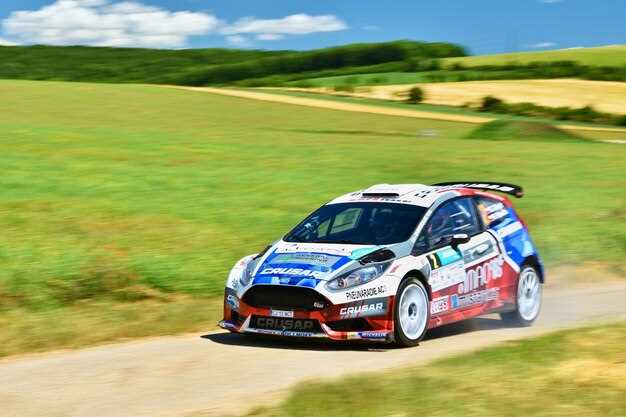How VW Became a Rally Champion

In the highly competitive world of motorsport, achieving success in the rally championship requires not only skillful drivers but also cutting-edge technology and strategic planning. Volkswagen (VW) has established itself as a formidable contender in this arena, demonstrating a commitment to excellence that has led to remarkable achievements on various rally stages.
The journey towards championship success for VW began with a deep understanding of the unique challenges posed by rally racing. Unlike traditional circuit racing, rally demands a versatile approach, with drivers navigating through diverse terrains under unpredictable weather conditions. VW’s engineering team focused on developing vehicles that not only deliver exceptional performance but also ensure reliability in the face of such challenges.
As VW advanced in the rally championship, its strategic partnerships and investment in research and development played a critical role in gaining a competitive edge. By collaborating with experienced drivers and utilizing advanced driving techniques, VW enhanced its performance, securing a reputation for innovation and resilience within the rally community. This combination of talent and technology solidified VW’s place in the pursuit of rally championship glory.
Key Innovations in VW Rally Cars
Volkswagen has consistently pushed the boundaries of engineering and design in the world of rally racing. One of their most significant innovations is the implementation of 4MOTION all-wheel drive technology, which provides enhanced grip and stability on varying terrains. This feature has been crucial in helping VW drivers maintain control during high-speed rally stages.
Another groundbreaking innovation is the use of lightweight materials such as carbon fiber and aluminum in the construction of rally cars. These materials reduce overall weight without compromising strength, allowing for improved acceleration and agility on the rally circuit. As a result, VW cars have better responsiveness, crucial for navigating the demands of championship courses.
The integration of advanced aerodynamics has also played a vital role in VW’s rally success. Enhanced aerodynamic designs minimize drag, allowing for greater speed and efficiency. Features such as adjustable spoilers and streamlined body shapes have been meticulously engineered to optimize airflow, particularly at high speeds.
In addition to physical innovations, Volkswagen has invested in cutting-edge technology for real-time data analysis during races. This data-driven approach allows teams to make informed decisions regarding strategy and performance adjustments. The incorporation of telemetry systems provides valuable insights into car behavior, enhancing competitive edge in rally championships.
Furthermore, VW has prioritized engine performance through the development of turbocharged units that deliver higher torque and power at varied RPMs. This capability ensures that drivers can maximize their performance during challenging stages while maintaining reliability–a critical factor in long rally events.
Overall, Volkswagen’s commitment to innovation in rally car design has played an instrumental role in their dominance in championship racing, demonstrating that technology and engineering excellence are key contributors to success in this highly competitive sport.
Strategies for Developing Winning Teams in Rally Racing

To secure a championship title in rally racing, teams like VW must prioritize several key strategies. Firstly, cultivating a strong team culture is paramount. This includes fostering trust, clear communication, and collaboration among all members, from drivers to engineers and support staff. A cohesive unit can adapt to challenges better, ensuring that each team member performs optimally during high-pressure situations.
Secondly, investing in training and development cannot be overlooked. Continuous skill enhancement for drivers and support staff is essential to keep pace with evolving technologies and rally techniques. Regular practice sessions, simulation training, and workshops can build both individual competencies and team synergies.
Thirdly, effective data analysis and feedback mechanisms play a critical role. Employing advanced telemetry and data gathering systems allows teams to analyze performance metrics in real-time, providing insights that can lead to improved strategies on the track. Teams should prioritize learning from each rally to refine their approach for future competitions.
Additionally, fostering innovation within the team can significantly impact performance. Encouraging engineers to experiment with vehicle modifications can lead to breakthroughs in car performance. VW’s commitment to R&D can harness these innovations, potentially giving them an edge over their competitors.
Moreover, strategic partnerships and sponsorships are vital for ensuring financial stability and access to advanced resources. Collaborating with technology firms and automotive experts can enhance the team’s capabilities, allowing them to stay at the forefront of rally innovations.
Lastly, mental preparation is crucial in rally racing. Drivers face intense psychological pressures, and equipping them with coping strategies, such as mindfulness techniques and mental conditioning, can help them perform under stress, contributing to the overall success of the VW team in their championship pursuits.
Analyzing VW’s Performance Data in Championship Events

Volkswagen (VW) has established itself as a formidable contender in various championship events through meticulous analysis of performance data. This data-driven approach enables the team to refine vehicle dynamics, optimize driving strategies, and enhance overall competitiveness in rallies. Each championship presents unique challenges, compelling VW to tailor its vehicles specifically for differing terrains, weather conditions, and event regulations.
Performance metrics, such as acceleration times, braking distances, and cornering speeds, are critical in assessing VW’s capabilities against other teams. By collecting detailed telemetry data during practice runs and competitive events, engineers can identify performance bottlenecks and make real-time adjustments. This iterative process ensures that the VW vehicles are always at the cutting edge of technology and performance.
Moreover, analyzing tire wear patterns and fuel efficiency during championship events allows VW to strategize pit stops, optimizing overall race time. Data on competitor performance further equips VW’s crew with essential insights to anticipate rivals’ moves and adapt accordingly. Such comprehensive performance analysis not only highlights VW’s strengths but also illuminates areas for improvement, ensuring sustained success in championship standings.
Ultimately, VW’s commitment to harnessing performance data underscores its strategic mindset. By leveraging high-tech analytics and continuous feedback loops, VW remains poised to dominate in the highly competitive arena of rally championships.



